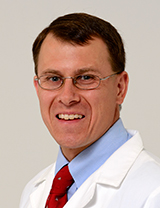June is Men’s Health Month, and with Father’s Day approaching, UConn Today asked Dr. Timothy Lishnak, UConn Health family medicine physician, to share some of his observations. Lishnak is a graduate of the UConn School of Medicine, the UConn/Saint Francis Hospital and Medical Center Family Medicine Residency Program (for which he now serves as assistant program director), and the UConn/Saint Francis Hospital and Medical Center Family Sports Medicine Fellowship Program. He sees patients of all ages, from newborn to elderly, at UConn Health’s family medicine practice in Canton.

There seems to be a perception that men don’t do a great job when it comes to taking preventive health steps. What do you find in your practice?
There is certainly some room for growth. On average men are less likely to present for preventative care, particularly younger men. In my practice, when I see a 30-ish male I’ll often ask him what is wrong or who made him come to the appointment.
When it comes to unhealthy lifestyle choices or avoidable health risks among your male patients, what would you say are the biggest offenses?
The biggest health risk we see, not solely in men, is lack of regular exercise. It really is the best medicine.
Can men do better with being forthcoming with their doctor when discussing behaviors such as smoking, drinking, sexual activity, etc.?
Assuming that I’m having a conversation with a male patient it means he’s actually taken the time and effort to make it to a visit and in order to get the most out of it, which I presume he would want to, he needs to be honest about behaviors that can impact his health such as substance use (alcohol, tobacco, drugs). We’re not here to judge him, we’re here to try and help him achieve and maintain wellness.
‘In my practice, when I see a 30-ish male I’ll often ask him what is wrong or who made him come to the appointment.’
Which aspects of men’s health do you find your patients historically don’t worry about enough, and which, relatively, might they worry about more than they should?
It gets back to the diet/exercise/weight perspective. Following a healthy diet, maintaining a healthy weight, and exercising on a regular basis will go a long way. In terms of things they worry too much about I generally find that men tend to underestimate things rather than overestimate them.
When conversations with your patients turn toward potential problems specific to men, and you refer them to a specialist, how reliable (and timely) are they in following up with those specialists?
Generally when we refer a male patient it is for something that is bothering him and therefore he’s taken the time to come in and discuss it. Hence he is pretty motivated to see it through and if there is a specialty visit recommended, or an additional test, he is eager to move forward. We often have patients who have a testicular concern, they’ve felt a lump or have some discomfort. If we can’t determine the exact nature at the visit, we’ll get more information such as an ultrasound, they’re good about getting this done.
As a family medicine physician, how do you find your advice resonates with your patients who are fathers?
I find that in fatherhood they tend to take a more proactive role in their health. We discuss how in some ways it isn’t only about them anymore, they should be enacting healthy behaviors not just because it is good for them but so they can be there for their family and also serve as a good role model, their kids are looking up to them.
Learn more about family medicine at UConn Health, or call 860-679-4477 for an appointment.



